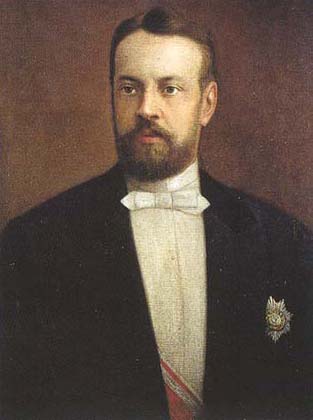

Queer Places:
Alexander Nevsky Monastery, Ploshchad' Aleksandra Nevskogo, 1 А, Sankt-Peterburg, Russia, 191317
 Count
Sergei Yulyevich Witte (29 June [O.S. 17 June] 1849 – 13 March [O.S. 28
February] 1915), also known as Sergius Witte, was a highly influential
econometrician, minister, and prime minister in Imperial Russia, one of the
key figures in the political arena at the end of 19th and at the beginning of
the 20th century.[2]
Count
Sergei Yulyevich Witte (29 June [O.S. 17 June] 1849 – 13 March [O.S. 28
February] 1915), also known as Sergius Witte, was a highly influential
econometrician, minister, and prime minister in Imperial Russia, one of the
key figures in the political arena at the end of 19th and at the beginning of
the 20th century.[2]
His Victorian and European masculinity was complex enough that it saddled upon him military valor, the male gaze that he directed at the bodies of actresses, prima ballerinas, and opera sopranos, male friendship that hinted at the homoerotic and explicitly extended to a mentoring relationship, from which his career benefited, with one of the most openly homosexual men of late imperial high society, and finally marriage to women whose divorces from their estranged husbands he arranged.
Vladimir Lamsdorf worked in tandem with Witte in the formulation of Far Eastern policy. Doubtless, Witte expected this when he responded to the tsar's request for the name of a suitable person to head the Ministry of Foreign Affairs by recommending the count. The fact that Nicholas II waited a month before making the appointment suggests that he was not enthusiastic about the candidate, whom he reportedly referred to as "madam" because of the count's homosexuality. For Witte instead, the appointment was a godsend, what with Far Eastern affairs coming to a boil.
Most notable were Witte's well-established ties to Prince V. P. Meshchersky, an influential conservative publisher, who was a confidant of both tsars Alexander III and Nicholas II, and a man who shepherded Witte's career when he first came to St Petersburg. Witte then spurned him during the very first years of his ministerial career. Meshchersky was also one of the most prominent homosexual men in imperial high society. Judging from correspondence they conducted in the early 1890s that Witte preserved in his private papers, their relationship involved love—at least in Meshchersky's eyes. 'The dacha where I am now living and writing to you is very dear to me, for here between us was established our friendship,' Meshchersky wrote. 'Here with all my soul I loved you for a bit, and learned to understand you and value you, and here too I realized that you taught me not just to esteem you, but (to be) as your friend!'
Witte was neither a liberal nor a conservative. He attracted foreign capital to boost Russia's industrialization. Witte served under the last two emperors of Russia, Alexander III and Nicholas II.[3] During the Russo-Turkish War (1877–78) he had risen to a position in which he controlled all the traffic passing to the front along the lines of the Odessa Railways. As Minister of Finance Witte presided over extensive industrialization and the management of various railroad lines. He framed the October Manifesto of 1905, and the accompanying government communication, but was not convinced it would solve Russia's problem with the Tsarist autocracy.
On 20 October 1905 he became the first Chairman of the Russian Council of Ministers (Prime Minister). Assisted by his Council he designed Russia's first constitution. Within a few months, he fell into disgrace within court circles as a reformer. He resigned before the First Duma assembled. Witte was fully confident that he had resolved the main problem—providing political stability to the regime,[2] but according to him the "peasant problem" would further determine the character of the Duma's activity.[4]
He has been described as the 'great reforming finance minister of the 1890s',[5] 'one of Nicholas's most enlightened ministers',[6] and the architect of Russia's new parliamentary order in 1905.[7]
My published books: